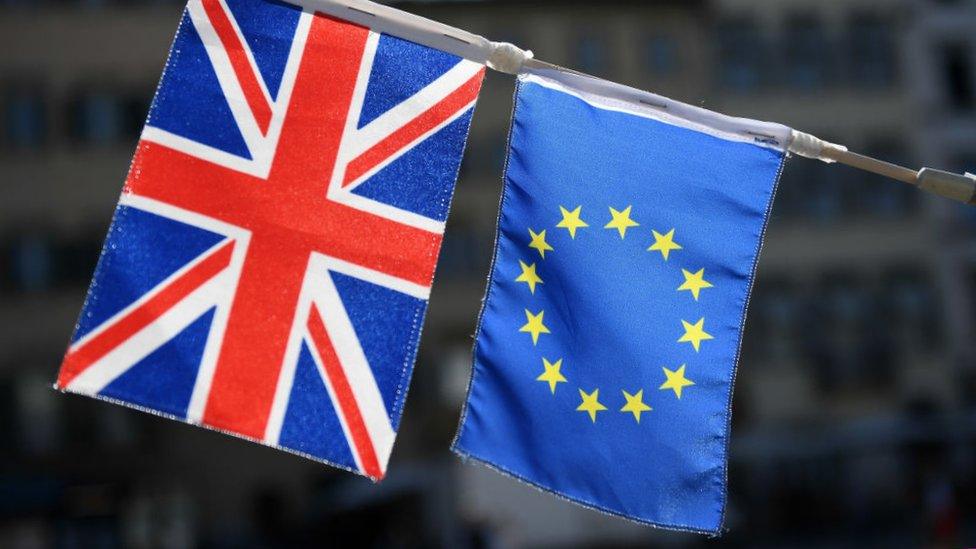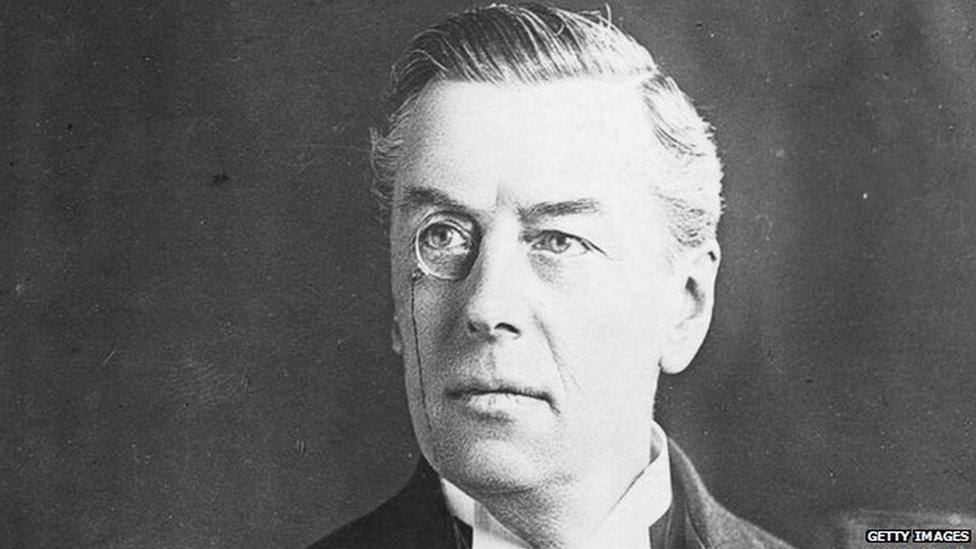Midlands Brexit hokey-cokey: In, out, shake it all about
- Published

"You do the hokey-cokey and you turn around. That's what it's all about."
So now we know. THAT'S what it's all about: the hokey-cokey, Brexit and all.
Whoever came up with that epic lyric must surely have had Britain's tangled relationship with the rest of Europe in mind when they penned these defining, uncannily prophetic, verses:
"In out, in out, you shake it all about"
And we do have a VERY long history of shaking it all about, especially here in our part of Britain.
Cue the time machine.
It was in the year 60 AD that the Battle of Watling Street was fought on a site generally believed to be near Mancetter in North Warwickshire. The Romans defeated a much larger force led by the warrior queen Boudica (aka Boadicea) and thus helped to shape nearly 400 years history, during which Britain was one of the Roman Empire's most cherished conquests. But remember, it was also to become the first province to leave the Roman Empire in the fourth century: whether the Romans were driven out or left of their own accord remains a matter of historical conjecture to this day.
But there's no disputing the biggest single precedent for Brexit. Henry VIII withdrew his realm from the aegis of the Roman Catholic Church by means of a series of Acts of Parliament between 1532 and 1534.
Anyone who has squeezed into those celebrated "priest holes" in countless National Trust properties can vouch for the enduring divided loyalties this provoked in a troubled nation. The Gunpowder Plot of 1605 was largely conceived in and around Coughton Court near Alcester (yes, yet another Roman name) in Warwickshire.

Henry VIII withdrew his realm from the aegis of the Roman Catholic Church by means of a series of Acts of Parliament between 1532 and 1534
I wonder if some latter-day archaeologists will eventually find similar little hidey-holes for closet Remainers in a post-Brexit Britain.
Discuss.
"Left arm in, left arm out... Right arm in, right arm out"
Our local history is dotted with yet more warnings for our present day leaders on the Parliamentary Left and Right.
Conservatives who may be contemplating the possibility of the EU withdrawal agreement being navigated through Parliament with the support of some Labour backbench rebels may be advised to look again at what happened to Tamworth's most famous son, the Conservative Prime Minister Robert Peel. Moved by the scale of poverty and malnutrition in emerging industrial cities including Birmingham, in 1846 Peel repealed the Corn Laws. These laws had long protected the prices charged by landowners for their grain but now they were putting unrelenting upward pressure on the cost of food in the cities. In driving their repeal through a tumultuous Parliament with the support of a significant contingent of Whig MPs, Peel achieved an important shift towards the defining Victorian doctrine of Free Trade.
But his reliance on those Whigs split his own party wide open: his government collapsed and the Conservatives were to enjoy no sustained period of majority rule for a further 20 years.
But it is the one-time mayor of Birmingham Joseph Chamberlain who has the remarkable distinction of having split not one, but two major parties: first, his own, the Liberals, and then the Conservatives with whom he served as Colonial Secretary between 1895 and 1903 in Arthur Balfour's coalition government. By then, those Free Trade principles associated with the Victorian era were being challenged by a new generation of leaders who, like Chamberlain, favoured tariff reforms to give preference to trade with countries in the British Empire.

Joseph Chamberlain became mayor of Birmingham in 1873
Chamberlain resigned from Balfour's administration in 1903 to further his campaign for Imperial Preference. The problem for the Conservatives was that a significant number of them followed him out of the door. The party suffered a landslide defeat in 1906 and remained out of office until 1922.
But then, in 1924, yet another Midlander, Stanley Baldwin, Conservative MP for Bewdley, became Prime Minister. One of his first acts was to establish the Empire Marketing Board: if only Chamberlain had lived to see it!
Is history repeating itself?
"This is all just SO last century," you may say. But remember the current Brexit debate has prompted economists to renew their interest in Britain's potential trading relationships with the 53 countries belonging to the empire's successor organisation, the Commonwealth.
And history has some lessons for us about divisions within the major parties too.
Latest research suggests most grassroots Conservatives would prefer Britain to leave the EU with no deal rather than the one currently on offer, much against the wishes of their party leader. And most Labour members want a further EU referendum, much against the wishes of theirs.
As Parliament returns from its Christmas and New Year break, the 'meaningful vote' postponed from last month is now due to take place next Tuesday 15 January: that's according to the Government's business managers. For now.
So the stage is set for yet more in-fighting among the warring factions of our two biggest parties. Now, though, the clock is ticking down to under 80 days to go until Brexit Day. You do not need to have an over-developed eye for history to see the potential for even more party political dissention, division and fragmentation.
Or will the threat of imminent execution concentrate MPs' minds?
I wonder if a new wave of prominent Midlanders could be about to play their part in this tortuous history: Sajid Javid perhaps? Or Gavin Williamson? Owen Paterson? Sir Bill Cash? Gareth Snell? Ruth Smeeth? John Spellar? Pat McFadden? Gisela Stuart?
The list goes on.....
And that really is what it's all about.